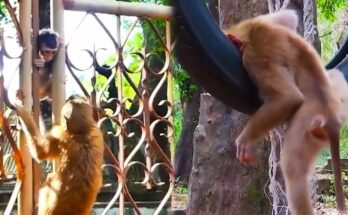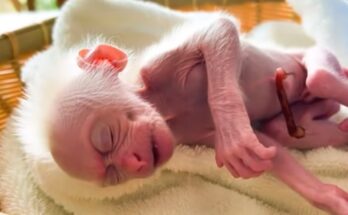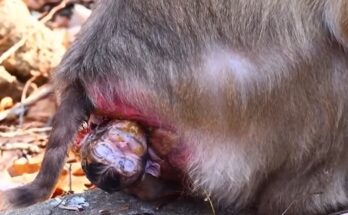In a quiet corner of the forest, a young monkey mother recently gave birth to her first babies. The delivery was fast and intense—an action-filled moment filled with instinct, movement, and raw emotion. As the newborns emerged, their tiny bodies were still wet, slick with birth fluids, and their limbs trembled as they tried to move closer to their mother.
The young mother, inexperienced and confused, seemed unsure of what to do next. She licked the babies gently, trying to clean them, but she didn’t settle into the usual nurturing behaviors. Unlike older mothers who instinctively guide their infants to nurse, this young mother remained restless, shifting often, unsure how to hold or help them. As hours passed, the babies remained wet and weak, struggling to find their mother’s nipples.
In primate species, the first hours after birth are critical. Newborns need warmth, cleaning, and—most importantly—milk. Nursing provides not only nutrition but also comfort and immunity. But in this case, the young mother’s anxiety and inexperience seemed to be preventing that crucial first bond.
Nearby troop members watched cautiously. In some monkey groups, older females may offer help or even take over care temporarily, but in others, the mother is on her own. The tiny babies cried softly, their strength fading as they failed to nurse.
Situations like this highlight the delicate balance of life in the wild. Even a natural event like birth can become dangerous if maternal instincts don’t fully develop. For this young mother and her newborns, survival depends on how quickly she learns to care for them.
There is still hope—many first-time mothers improve with time. But every minute counts. The forest holds its breath, waiting to see if these tiny new lives will endure.


